“Distant Skies”: Melissa Priblo Chapman Discusses Her New Book (Part 1 of 2)
Melissa Priblo Chapman dreamt of “riding through some distant town on a trustworthy horse” in elementary school. It was the late 1970s. When she was 23, she saddled her horse Rainy, hauled her puppy Gypsy into the saddle with her and headed west to live her dream. This week, I interviewed Melissa about her new book “Distant Skies: An American Journey on Horseback”. Here is Part 1 of a two-part series of our conversation.
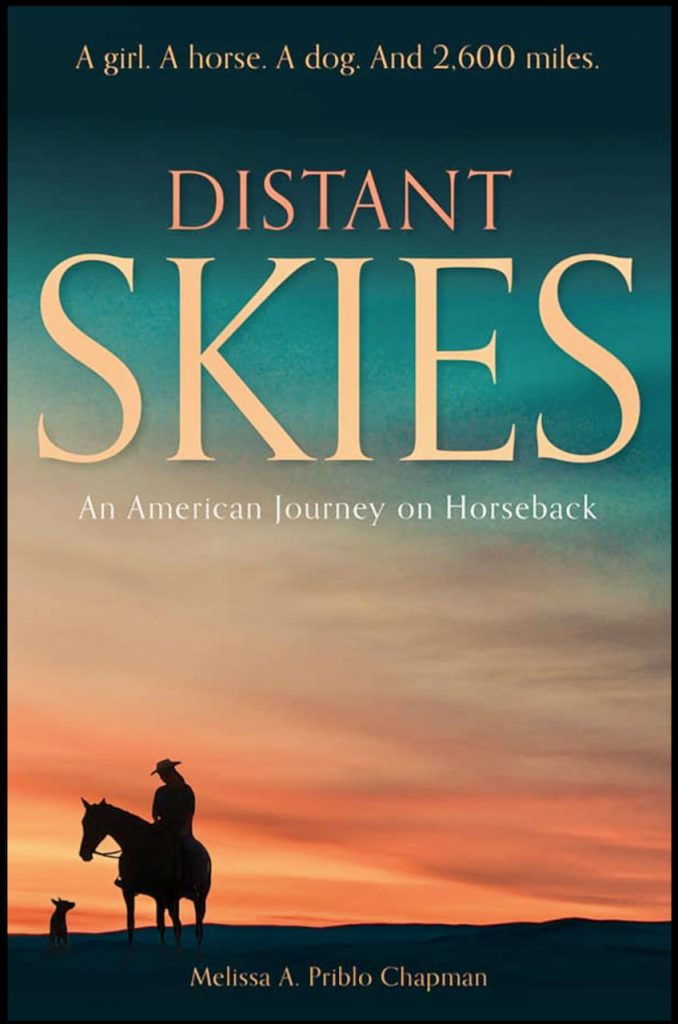
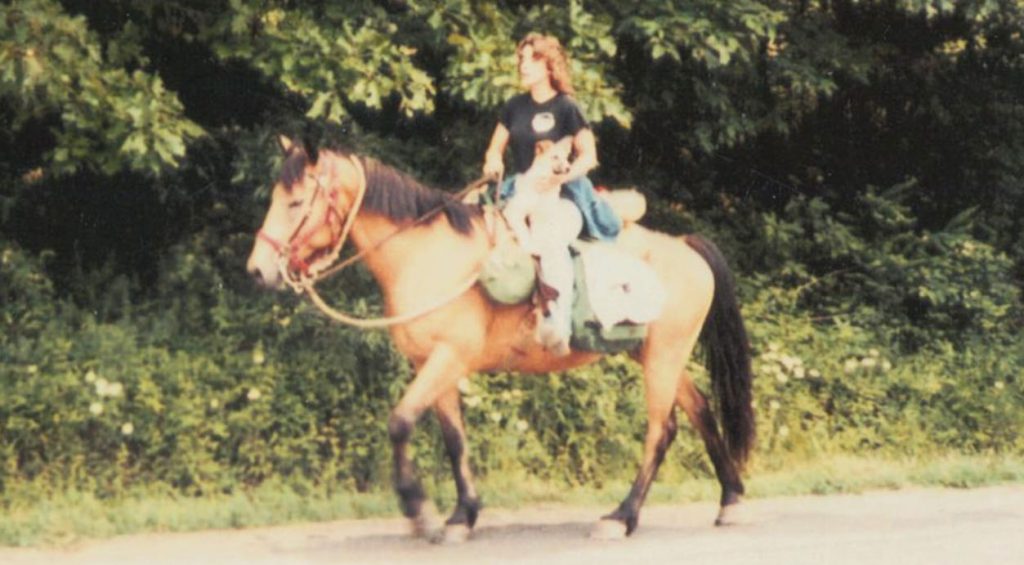
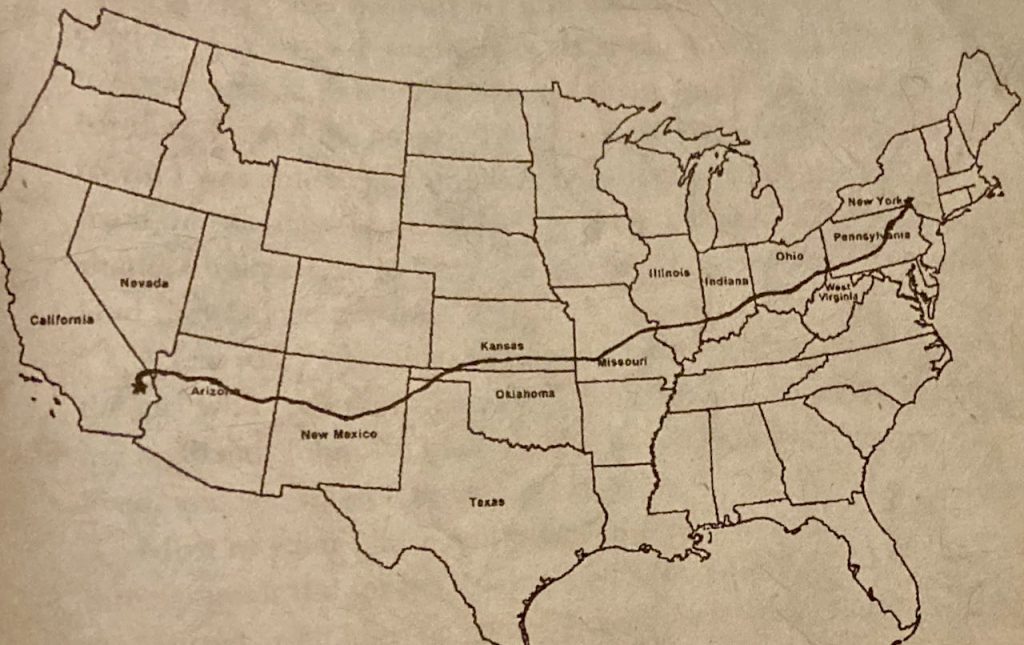
About Melissa’s Journey
Melissa began her voyage in New York state, crossed Kansas, dodged rattlesnakes in Texas, was denied water by a bitter housewife and watered her mounts from a cooler in the back of actor Ron Karabatsos’ car (Remember Cheers? He was in it). She arrived seven months later in California with not just Rainy and Gypsy, but a mule named Amanda and ten of Gypsy’s puppies. Her trip, she says, “Is where I went from a child to an adult.”
This is her story.
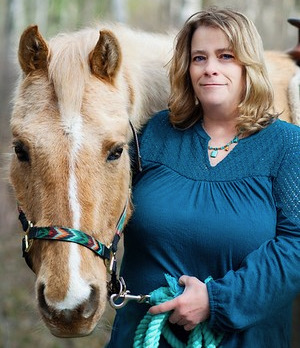
Note: conversation has been lightly edited for readability. All photos courtesy of Melissa Priblo Chapman.
Listen to the Interview
Read the Discussion Melissa and I Had About Her Book “Distant Skies”
The following is a transcript of the conversation Melissa and I had.
Bernie Harberts
Hi Melissa. Congrats on “Distant Skies”. Give me a quick idea of what your book is about.
Melissa Priblo Chapman
“Distant Skies” is based on a journey that I took when I was a young woman, 23 years old. That was 40 years ago, in 1982. It sounds funny to say 40 years because that’s a long time ago. It was the early eighties. There were no cell phones, no GPS, none of that stuff.
It started as a fantasy, just something that I dreamed up and couldn’t let go of. Traveling with a horse was everything I loved, being outdoors, riding, meeting people, but also being alone. It was kind of a fantasy, but as life went on, you know, as a young person, I just started to wonder, ‘Well, why is it just a fantasy? Why can’t you do that?’ And that’s how it started.
I had a wonderful horse named Rainy. He was a quarter horse. I left home and started out.
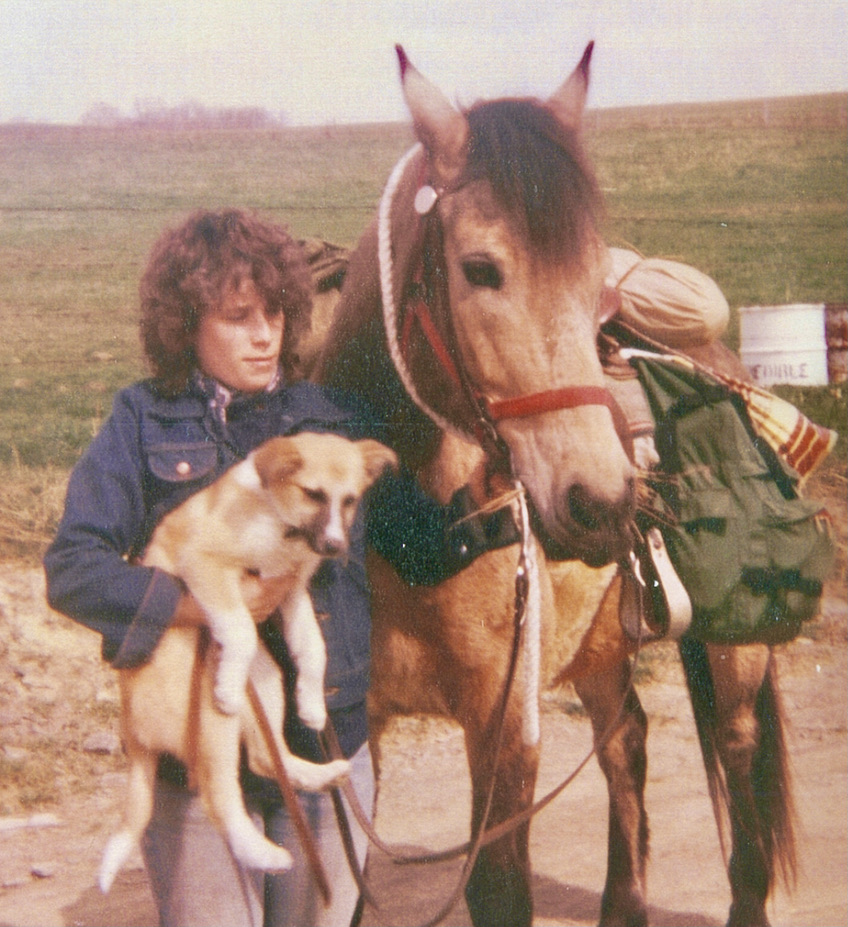
I started out thinking of this big trip and this big adventure, and it took me a few weeks to learn that it’s about small pieces each day. It’s about making each mile, sometimes even just the very minute that you’re in. But bit by bit and piece by piece, despite a lot of odds against us, my horse and my dog Gypsy moved ahead. We ended up making it from New York to California. We picked up a pack mule along the way, and she converted me into a mule person. That’s our story in a nutshell.
How to Prepare for a Horse Journey
Bernie
Tell me about your preparations, from when you thought of going until you went. Tell me how long it took and how you got ready.
Melissa
I think like anything that starts out like a dream or a fantasy, it could be building a house or writing a book, it starts loosely like, ‘this is what I wanna do.’ And then, as time goes on, if you’re really gonna try to make it happen, you have to start learning what it takes to make it happen.
For me, and this is probably a thing that a lot of horse people will smile at and identify with, I totally focused on the horse. I was like, ‘He needs this, and I gotta get him in condition.’ Like everything was about what the horse needs. And I still do that now. That’s why it takes me so long to do my barn.
I read a lot. I read about long distance riders when I could. Of course, there was no internet, so I couldn’t look up everything.
I was a big library person, a big reader, and I wrote to people. I had been fortunate to meet one Long Rider (a person that’s completed a 1,000-mile continuous saddle voyage) through my farrier. She came from California to Maine. So I got to ask her questions. And it just became sort of planning in that regard. There was no Trip Advisor or Google Maps in those days, so I just kind of thought I had an idea.
My mistake was that I was not emotionally prepared. I was young, so physical conditioning wasn’t as big of an issue. I never got real sore or anything like that. But when you walk away from everything, your job, everyone you know, then you can’t think, ‘oh, at the end of the day, somebody will come and take me home.’ It was a big adjustment, and that was the thing I was least prepared for.
I set off on my journey, and right from the start, I was surprised at how kind and good people were to us. That’s something I stand by to this day. Like every now and then, somebody says, ‘Oh, well, you were a young girl. Of course, people helped you.’ But I’ve heard stories from all kinds of people that have done similar adventures and the real stories about how amazing people are when they see that you’re vulnerable or your lonesome or you need water. That will always be a big part of that story.
Making Do and the Kindness of Strangers
Bernie
Making do with what you have and the generosity of strangers are a recuring theme in “Distant Skies.”
Melissa
They are. I did not grow up in a horsey family. I had to work for that and carved that into my life by pure determination. Later in life, when I was done with my Long Ride, and settled down and got married, when I was expecting my first child, I had a couple of people say, ‘Oh boy, you’re gonna have a hard time. You know, you’re kind of a free spirit.’
And I was like, ‘Are you kidding? I’ve been putting someone else’s health and welfare before my own since I was a teenager!”
Like, if I had one last crust of bread, my horse Rainy would get it before I would. And it’s the same thing about being a parent. So I was used to that, and it’s still that way.
Finding Food and Water on a Long Ride
Bernie
What did you do for food and water on your voyage?
Melissa
I started in the east, New York state, and it was spring. The first half of the trip and the second half of the trip were like two different trips. The first half of the trip was in the east. It was always the general store, a cute little diner, and the farmer who comes out and invites you to dinner. I always say the mothering instinct is alive and well in America because everywhere I went, people were trying to give Rainy and me food.
The second half of the trip was in the west. That was a different trip. From western Kansas on, there were a lot fewer people. Then food and water became a problem.
We got laid up in Kansas for a few weeks because Rainy needed some time off. That turned out to be a blessing in disguise because it gave me a reason to get a pack mule. That saved us because we could start carrying more feed and water. You can go a lot longer without food than water. And that was a huge issue. You learn to look for windmills. You also learn the lesson of the flatlands that just because you see a windmill up ahead doesn’t mean you’re gonna get there in an hour or two.
It seemed like the times that we needed help the most, we somehow found it. We did go without water longer than you would normally, but we always seemed to find it just in time.
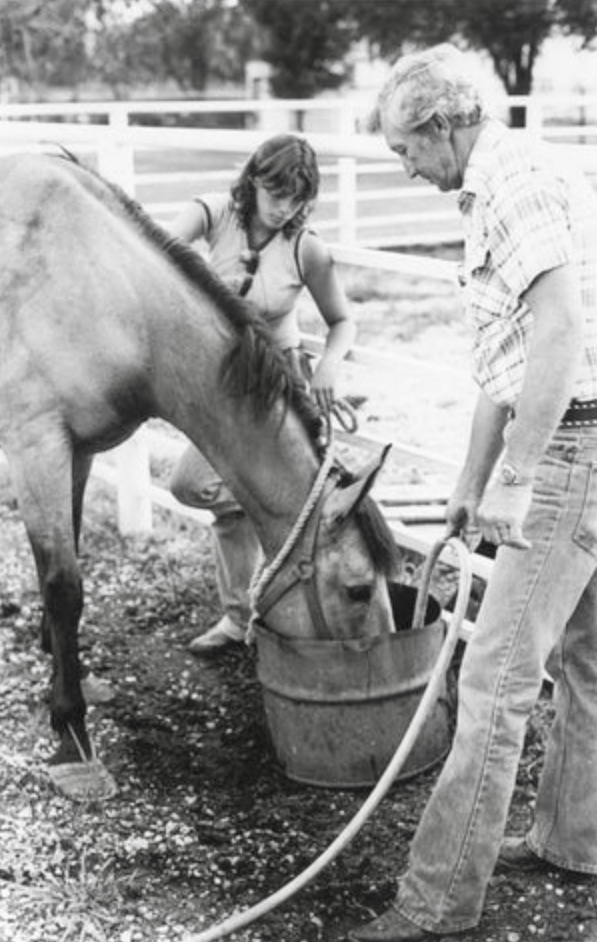
How to Keep a Horse at Night
Bernie
What did you do with your horse Rainy at night?
Melissa
A lot of times, I was able to stay at a farm or find a corral or a pen. Farther west, we also used railroad pens. Rainy was fantastic with hobbles, and I had fleece-lined hobbles. He never tried to get away or take advantage of that. My mule Amanda was so bonded and attached to him that I could just hobble him, and she would stick around. Their bond was amazing. There were spots where I’d have them grazing, and they’d leave crop circles around the tent if we stayed a full night or a day. I never had to worry like, ‘Oh my gosh, what if they take off?”
I never like camping next to a road. I’d go wandering off somewhere and just hobble Rainy out. It was not a big issue that he would take off.
Mission Fatigue
Bernie
Taking a saddle voyage that lasts for months can really wear you down, especially when you don’t have a support team helping you out. In many cases, the fatigue is more mental than physical. What signs of mental fatigue did you show on your trip, especially toward the end?
Melissa
For me, it was getting short with people. I’m a person that needs a lot of space. There was this time in New Mexico. I was having a problem with the packs, and Amanda was being a mule that day.
She was acting up next to a mailbox on a post. A big nail was sticking out of it, and she scraped against it. My packs just ripped wide open, and my feed’s falling out, along with my camera, and I’m trying to hold her and Rainy, and my stuff’s going all over the ground.
And right then, this car pulls up, and somebody asks me, “Can I take your picture?”
And I just go, ‘Can you leave me alone?”
I’m not like that. I’m never rude. I enjoyed it when people stopped and talked to me. I meant no meanness to this person. To this day, I regret that. I wish I could find the person and apologize to them.
So that’s when I stepped back and felt really bad because people were so kind and excited to see us. I felt really bad and thought, ‘why is Amanda acting up?”
The people and animals around us feed off us. I was like, ‘I need to fix this because I’m suddenly having a bad time. This is my life. I created this. Fix it.’
We stayed in the same place the next two nights, and I gave Rainy, Amanda and Gypsy some rest. It was like a mental rest for me. The animals calmed down too. They were fine. No surprise, right?
Spiritual Growth
Bernie
What kind of spiritual growth or bigger insight did you gain on your trip?
Melissa
That’s a hard thing to talk about because I’m not religious in the traditional sense, but I feel we’re all part of something big together. We’re all threads woven in the same tapestry.
Your thoughts turn inward when you’re alone all the time without humans. You get very introspective, and you can have clarity in your thoughts. You listen to your instincts. But also, at the same time that you’re going inward, you’re going outward because you’re vulnerable. You have to have trust, especially as a female, to say,’ I’m putting myself out in the world, and I just feel like it’s what I need to do.’
So many people I’ve met have told me that my trip meant something to them. They also say, more than ever, ‘Oh, it’s such a crazy, bad world. You know, I wouldn’t bring kids into this world. I wouldn’t do this.’ I don’t think that way.
Everybody has a story. I stayed with a little old lady, and she was sweet and collected salt and pepper shakers. Halfway through dinner, I found out her whole family had been killed by a drunk driver, her husband, and her kids, all at once. She said, ‘You’re here, and we’re telling stories, and this is the most fun I’ve had in two years.’
That’s my sense of how we’re all connected and how we can all mean something to each other.
Let Your Kids Go
Bernie
Your parents worried when you set off on your trip. You’re a parent now. What would you say if one of your kids said, ‘Hey, mom, I’m going to saddle up and ride off? ‘
Melissa
I have four kids over twenty. My oldest son is thirty one. They’re adventurous, and I would have to support them. Would I be terrified and worried? Yes. But I would support what they wanted to be because you can’t be afraid of the world. You won’t live your right life if you’re afraid of everything. Now I don’t mean being stupid. It is different for a female in some ways, but you learn to use your brain.
I remember riding through this real dismal area. There were three or four little trailer houses lined up, and they all looked rough. Two of them had motorcycles and junked cars parked out front, and one had a swing set. And I’m like, ‘Well, which door are you gonna knock on for water?’
You get smart about that stuff. but you also have to hope that you don’t cross paths with evil and danger. You do your best.
My kids were all Nineties babies, when the internet was exploding. That was during the era of Stranger Danger, where you were supposed to teach your kids not to talk to strangers.They knew the story of my trip, and I used to give a lot of talks at schools. I didn’t tell them, ‘Don’t talk to strangers.’
I do tell them, “Don’t go there. Be smart when you get in the car by yourself. Lock your door. I’m not saying everything’s butterflies and angels.’
But I never taught my kids to be afraid to talk to people or smile or say hi.
Changes in Saddle Travel in the Last Forty Years
Bernie
What’s the biggest change you’ve seen since you rode Rainy from New York to California in the early 1980s?
Melissa
Technology. In some regards, it’s safer now because there were times on my trip when no one in the world knew where I was for a couple of days. If I wanted to make a phone call, I had to wait until I got to a town and find a pay phone. I think if I took the trip now, I would carry a cell phone.
But to me, the biggest difference is the people. It’s sad that our politics have gotten so angry. I read a biography of Clarence Darrow about a year ago. Part of his big thing was labor versus the big rich corporations. People were bombing places and fighting and shooting each other. It was very ugly. Our country has been through really angry times and gotten through it. And I hope we do again. I still feel that people can be kind and generous.
Another big difference is that more city people have moved to rural areas like where I live. I’ve lived here for over 30 years, and our rural area has gotten a lot more traffic and new houses. People all drive trucks and vans now. There are more people in rural areas, and they’re driving faster and bigger vehicles.
I was comfortable on most roads during my ride. I didn’t go on busy roads or highways except for once. But I would make more of an effort to get even farther away from that just because of how people drive.
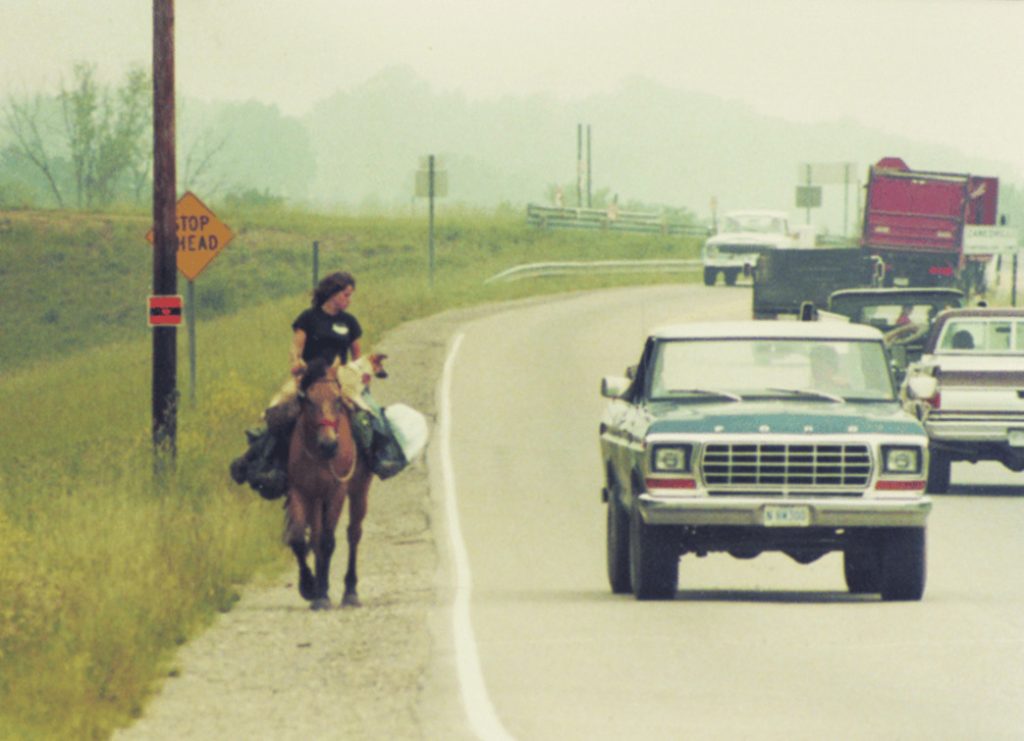
Chase Crews and Supported Rides
Bernie
What are your thoughts on supported rides? By that, I mean having a chase vehicle or support team follow a person on a long distance saddle voyage.
Melissa
I respect and appreciate anybody that’s doing something with their horse, but that’s not for me. There was just a big supported ride. They raised money for a good cause, but there was a whole team of people setting them up. I admire those people, especially when they’re raising money to help horses. But a supported trip and an unsupported trip, like I did, are different journeys.
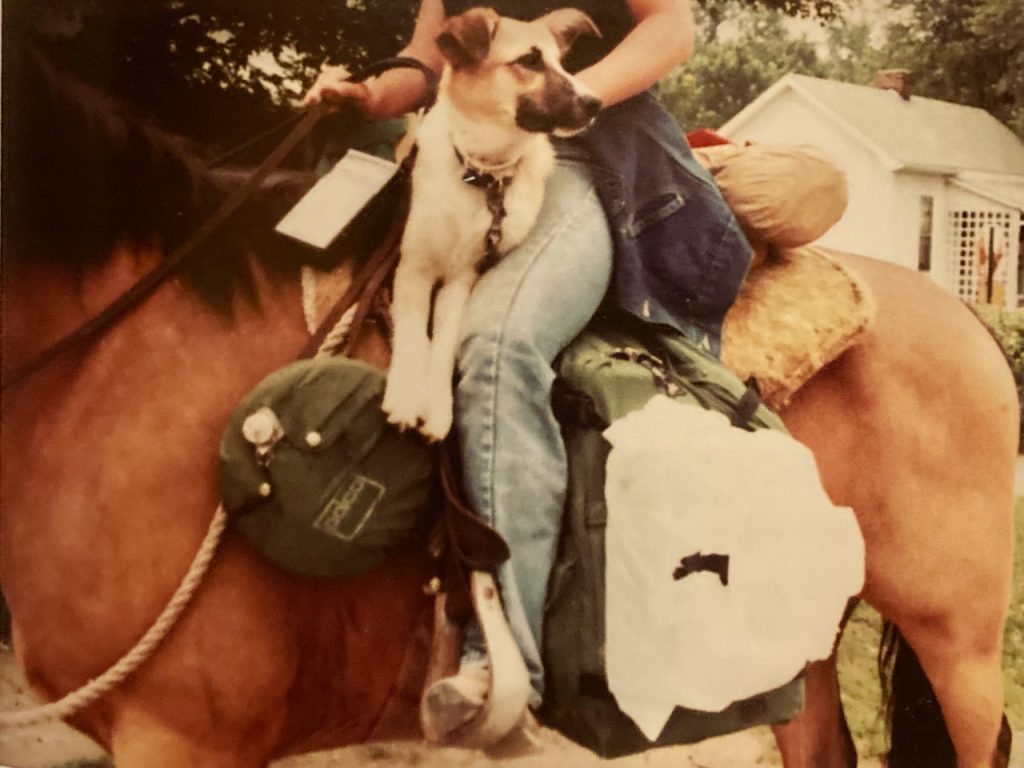
When you’re traveling without a support team or chase vehicle, you’re testing your resourcefulness, your emotional strength, your mental capabilities, and how you can make things work out. You have to make do. You have to find a safe place for yourself and your animals. You’re really testing yourself. It’s all up to you; you’re a better person because you challenged yourself.
Every now and then, you see those preppers on TV. They have guns and lots of stuff stored in their house, and I’m like, ‘but have you ever tested yourself? I might be a middle-aged overweight woman, but I know that if I get thrown out there, I’ll survive. That gives you strength. You can have lots of guns and wear all the camo clothes you want, but how does that test you?
Bernie
That’s a powerful point. Until you test yourself by stripping yourself down and becoming vulnerable, you don’t really understand what you have the power to do. And by that, I don’t mean with fancy equipment, but with your mind.
I see two ways to approach the unknown and things that might scare you. One is to hoard resources – save up buckets of wheat, hunker down in a bunker and wait for things to go wrong. The other approach, which is the one I subscribe to, is to head out into the world kind of vulnerable and discover that, damn, you’re gonna be okay. That’s an incredibly powerful feeling.
Melissa
“Powerful” is the right word. It’s that sense that I’m setting out to do something I really want to do, things will go wrong, but I’m going to make it through. I’ll figure this out. I’m gonna make this work. That’s a powerful tool that I think is missing from a lot of people in our modern world.
I don’t dwell on this, but I always think when they talk about terrorist attacks or chemical warfare, people should be aware that if there is anything like that, our world would come grinding to a halt, like prescriptions, appointments, and traffic lights. It’s good to have that inner sense that, you know, ‘I’ll figure this out. We’ll figure this out.”
Talk to Each Other
Bernie
When the lights go out, we’ll all start talking with each other so we can figure out the solution. This reminds me of a great sign I saw in front of a motel as I was riding my mules Brick and Cracker from North Carolina to Idaho. It said:
“We don’t have free wifi
Talk to each other”
Melissa
That’s a good sign!
Part 2 of my Chat With Melissa
You can read Part 2 of my conversation with Melissa right here.
Buy a Copy of Melissa’s Book “Distant Skies: An American Journey on Horseback”
I enjoyed “Distant Skies” so much that I read it twice. Buy your copy on:
Sign up to Hear When my New Book is Published
I’d love to give you a heads up when my new book “Two Mules to Triumph” is published.
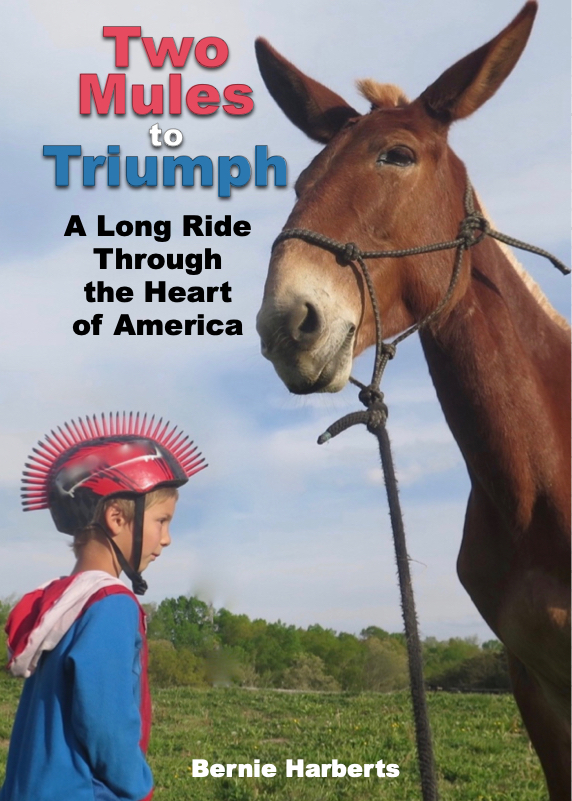
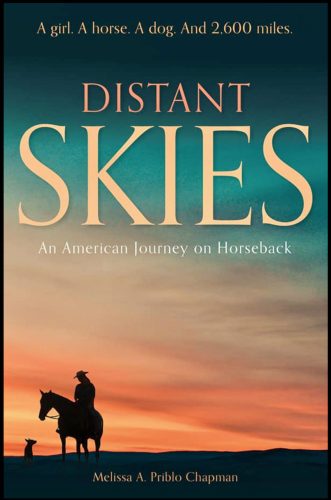
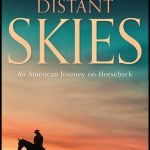
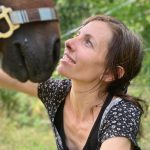
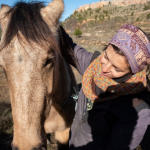
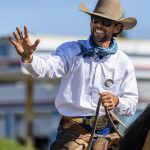

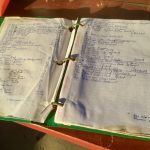


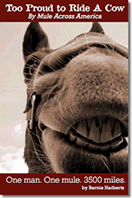
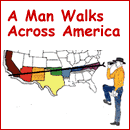
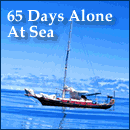
[…] We feel like you’re another member of our traveling tribe along with fellow travelers like Melissa Priblo Chapman and Filipe Masetti […]
[…] Part 1 […]